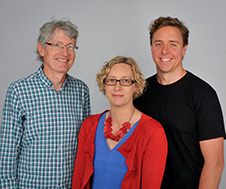 Friday 23 March 2018 1:51pm
Friday 23 March 2018 1:51pm
Can your local council stop you getting heart disease or cancer? Yes, say researchers in a new study led by the University of Otago, Wellington.
The study found that local councils and urban planners could improve our health and save lives by improving long-term sustainable transport (cycling, walking and public transport) options for New Zealand cities.
“The decisions that local Councils in New Zealand have made over the last few decades have had a big effect on the population's health,” says lead author of the study Dr Caroline Shaw, from the University of Otago, Wellington.

Some of the research team from University of Otago, Wellington (UOW), left to right: Michael Keall, Caroline Shaw, Ed Randal.
As a result of urban-planning decisions made over time, Wellington city has the highest levels of sustainable travel at 35 per cent; Christchurch has the highest level of cycling as a mode of travel, whereas Auckland has the highest level of multiple car ownership at 55 per cent.
In the new study, published in the New Zealand Medical Journal this week, the public health researchers set out to quantify what would happen if Auckland, Tauranga, Hamilton, Christchurch and Dunedin had the same levels of cycling, walking and public transport use as Wellington.
The researchers used an internationally recognised model (Integrated Transport and Health Impacts model) developed in the UK and adapted to New Zealand. They found there would be considerable health and carbon gains if the other five cities had made decisions that gave them the same levels of sustainable transport as Wellington city.
The cities' infrastructures are a result of decisions made by their local councils over recent decades. Cities differ in the amounts of walking, cycling and public transport use, reflecting different urban planning priorities over time.
“The health gains are mainly through increased physical activity, and to a lesser extent, as a result of reduced air pollution and reduced injury deaths,” says Dr Shaw.
As an example if Auckland had the same level of cycling, walking and public transport use as Wellington, then there would be about 57 fewer premature deaths each year and carbon emissions from cars and other light vehicles would be 20 per cent lower. Similarly, Tauranga and Hamilton would have 50-52 fewer premature deaths each year and 27-32% lower light vehicle carbon emissions respectively.
“The costs of preferentially funding infrastructure for cars are high,” says Dr Shaw. “This research shows we can address carbon emissions while also significantly improving health in cities.”
Dr Shaw notes that although Wellington provides a healthier urban form than other cities, New Zealand overall (including Wellington) still has a highly car-dominated transport system.
“Although Wellington has the highest levels of sustainable transport, there are still many opportunities to do better” says Dr Shaw.
Not only do sustainable transport systems allow better health through increased physical activity, they also help reduce the road toll, which is now increasing again in New Zealand.
For further information contact:
Dr Caroline Shaw
Department of Public Health
University of Otago, Wellington
Email: caroline.shaw@otago.ac.nz
A list of Otago experts available for media comment is available elsewhere on this website.
Electronic addresses (including email accounts, instant messaging services, or telephone accounts) published on this page are for the sole purpose of contact with the individuals concerned, in their capacity as officers, employees or students of the University of Otago, or their respective organisation. Publication of any such electronic address is not to be taken as consent to receive unsolicited commercial electronic messages by the address holder.